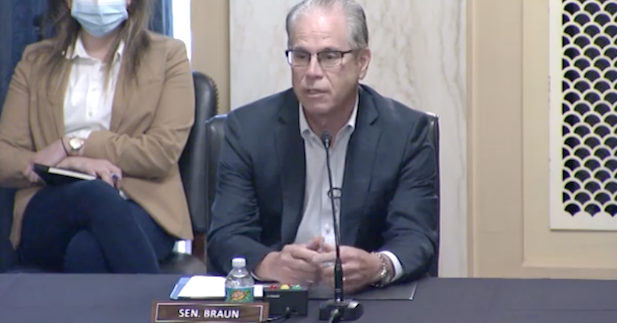
Senator Mike Braun, sponsor of the Growing Climate Solutions Act, discusses the bill in a committee hearing on April 22.
By Steve Valk
When legislation has broad bipartisan support, it can move pretty quickly through Congress. How quickly? Two days after it was reintroduced in the Senate last week, the Growing Climate Solutions Act (S. 1251) was passed by voice vote in the Agriculture, Nutrition and Forestry Committee.
Committee Chair Sen. Debbie Stabenow (D-MI), an original cosponsor of the bill, told E&E News, “I’m very confident we’ll be able to bring it up on the floor” in a matter of weeks.
A bipartisan companion bill was introduced in the House on April 22 by Rep. Abigail Spanberger (D-VA-07) and Rep. Don Bacon (R-NE-02) with more than 20 cosponsors.
The Senate legislation, sponsored by Sen. Mike Braun (R-IN), is a collaborative effort that came together last year with Sen. Braun’s Climate Solutions Caucus colleague Sen. Stabenow. With a few adjustments, the bill was reintroduced on April 20 with the support of both Sen. Stabenow and Agriculture Committee Ranking Member Sen. John Boozman (R-AR), ensuring the bill would get swift action.
Climate-smart farming has CCL support
Agriculture accounts for about 10% of greenhouse gas emissions. The Growing Climate Solutions Act will help farmers and foresters become part of the climate solution by providing the technical assistance to help them access carbon credit markets so they can be paid for climate-smart practices that sequester carbon.
Citizens’ Climate Lobby supports this bill, among several others, because it would complement carbon pricing. CCL volunteers have brought up the bill as a “supporting ask” in lobby meetings, which likely played a part in the legislation attracting cosponsors — 43 as of May 4 — from both sides of the aisle.
“Our volunteers really leaned in on lobbying for this bill, and many of the Republican cosponsors heard a lot from the volunteers about this,” said Ben Pendergrass, CCL Senior Director of Government Affairs. “We are happy CCL was able to play a role in advancing this positive and pragmatic legislation.”
As we know from efforts last year, CCL volunteer engagement can be a critical factor in helping a policy gain more traction in Congress. In 2020, CCL supported the Better Energy Storage Technology Act, making a push that helped to add 24 cosponsors, both Republican and Democrat, during one week in July. The bill eventually attracted 102 cosponsors and was included in the Clean Economy Jobs and Innovation Act, passing the House on Sept. 24.
CCL liaisons and volunteers lobbied to advance the bill
One of the volunteers who leaned in on the Growing Climate Solutions Act was Mac Cantrell, who’s been the CCL liaison for Sen. Mike Crapo (R-ID) for the past three years. He said the Growing Climate Solutions Act came up in their lobby meeting with staff last June and again in December. His group also organized a meeting with agricultural stakeholders to talk about the bill.
“Our Palouse chapter has been working for some time at building relationships with area farmers,” Mac said. “A few of them helped us put together a meeting in February for farmers and agricultural producers that [Sen. Crapo’s district aide] came to, so this may also have had an effect.”
Sen. Crapo’s aide said it was important to the senator that the bill is bipartisan, and they also appreciated the respectful approach CCL volunteers take in their lobbying activities.
In a statement about why he supports the bill, Sen. Crapo said, “Idaho is a national leader in the use of clean, renewable power, and this legislation allows Idaho’s farmers and forest landowners to more easily access private, voluntary carbon markets and be rewarded for climate-smart practices. I continue to support policies like this that protect ecological health, facilitate sustainable and multiple use of our public lands, and incentivize the proper stewardship of private property.”
In Alabama, volunteer Emily Northrup said her group met with staffers for Republican Sen. Tommy Tuberville on March 29 and made this pitch for the Growing Climate Solutions Act:
“In his comments before the Agricultural committee the Senator said that farmers and foresters should take the ‘lead in tackling climate change.’ To that end, we ask that Senator Tuberville support the Growing Climate Solutions Act. This is a market-driven, incentive-based program for farmers and foresters to voluntarily participate in the market for carbon credits.”
Emily followed up with a letter to the editor published in three Alabama newspapers on April 18 that opened by acknowledging Sen. Tuberville for his remarks in the Agriculture Committee hearing. In that letter, she made her pitch publicly:
“A way to financially reward voluntary climate-smart farming methods is with the Growing Climate Solutions Act, a bipartisan, bicameral bill from the previous Congress that will be reintroduced soon. This market-based legislation provides the critical technical assistance growers need to access carbon credit markets and get paid for the carbon their activities sequester.”
She sent the published letter and a one-pager about the bill to the staffers they met with, one of whom replied with a thank-you note. On April 22, the staffer wrote, “You will be happy to hear that Senator Tuberville is a cosponsor of the Growing Climate Solutions Act — we signed on earlier this week.”
A coalition supporting climate solutions
CCL is among more than 70 agricultural and environmental organizations supporting the bill. Other businesses and organizations backing the legislation: The American Farm Bureau Federation, Archer Daniels Midland Company, Citizens for Responsible Energy Solutions, Environmental Defense Fund, National Audubon Society, The Nature Conservancy, Conserv America, and Tyson Foods, Inc.
In a statement posted on the Agriculture Committee’s website, CCL’s Ben Pendergrass said, “America’s farmers and ranchers bear an outsize burden of the impacts of climate change, but they can also play an important role in addressing America’s greenhouse gas emissions. This bill is an important step to giving farmers, ranchers, and foresters new tools to address climate. Citizens’ Climate Lobby applauds quick action on this legislation.”
We’re glad our staff and volunteers’ efforts could help generate even more bipartisan support for this legislation. Between that and the broad coalition outside of Congress supporting the bill, the Growing Climate Solutions Act may soon be headed to the Senate floor.


